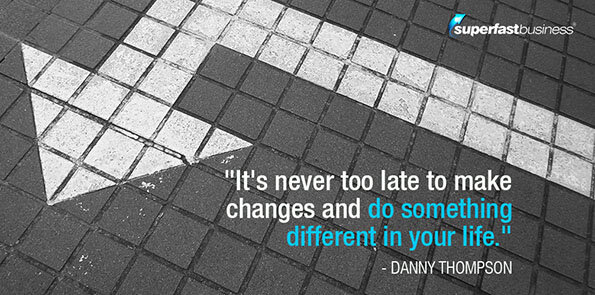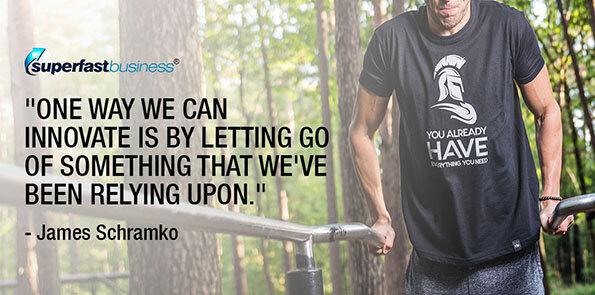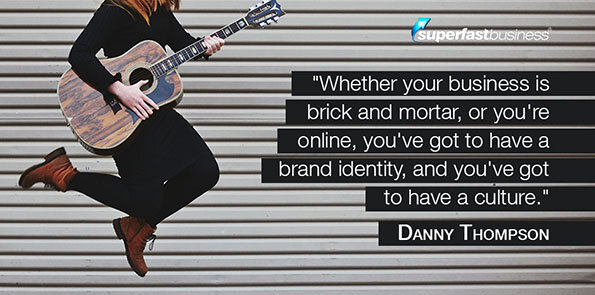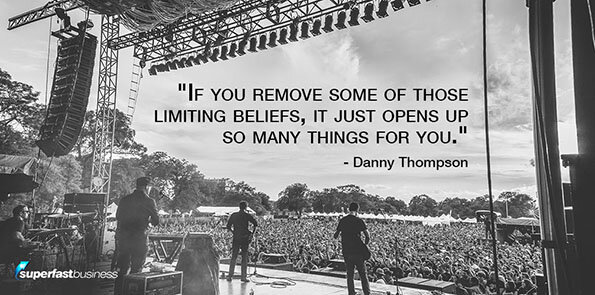Touring Europe, drummer Danny Thompson would binge on business podcasts, among them Freedom Ocean. He ran a music school at that time and wanted to do something for it on the net. Marketing, he thought.
In 2020, Danny was pushed to take his business, The Music Factory, virtual. More than just marketing, they now do almost everything online. Hear how they overhauled operations and manage to stand out among the many offering music lessons online.
Podcast: Download (Duration: 54:35 — 50.3MB)
Get Notified Of Future Episodes Apple Podcasts | Spotify | Amazon Music | Android | Blubrry | Gaana | TuneIn | Deezer | Anghami | RSS | More
Episode highlights:
Implement the online business model that works for you with James’s help
Danny Thompson of Punk Rock Business School has been listening to James since FreedomOcean days. He can distinctly recall touring the UK with his band, Face to Face, listening to James speak with Timbo Reid, and thinking for the first time about digital marketing.
A musician with a passion for business
Like James, Danny has a background in retail. He worked for Guitar Center quite some time, after falling out of playing music (drums were his instrument from an early age, and still are).
Danny got into Guitar Center early, when there were just 10 stores nationally in the US. He realized working there that as much as he loved playing music, he also was passionate about business. He loved the concept, and digging into the numbers.
As Guitar Center expanded its reach, Danny rose through the ranks. He made good money, but it was 60 hours a week, six days a week, and every holiday that people normally got the day off. He was learning a lot as he progressed, but he had the feeling that he hadn’t really achieved what he could have in music. And he knew he wanted to get out of retail.
That will never sell online…
The internet then was very new. At meetings, they would joke, no one’s going to buy a $2,000 Les Paul online. Of course, now, that’s pretty much the only way somebody would buy one.
People said the same thing about Carvana and all the car companies that are now selling online. James recalls the state General Manager of Mercedes-Benz telling them the net was a fad, and to keep their focus. What he noticed then, however, was that customers were coming into the showroom knowing as much as the salespeople did about the stock, and even more about the models that were coming.
Three or four years before Danny left Guitar Center, the company purchased Musician’s Friend, which was then the largest online musical instrument retailer in the world. Their top execs clearly knew where things were headed.
The long-delayed escape from the cubicle
Danny, however, knew he wanted to do something on his own. And he still wanted to play music. This really hit him at a corporate meeting, where they had a huge mural on the wall depicting the view from a music stage – an audience of thousands. He didn’t belong there in that suit and tie, he realized. And that prompted him to open Music Factory, his music school.
At the time, he was still employed, but there wasn’t really a conflict. Two years later, the company moved from public back into the private sector, and Danny made the jump.
He’d also been playing music again on the side for fun. People would take notice and suggest he try out for this band or that that just got a record deal. He’d decline, because even at that level, there wasn’t much money to be made from such music jobs. And Danny had built up a lifestyle in corporate that needed some money. Starting his own business was a way that he thought he could get out and play music. And that’s eventually what he did.
About six months after leaving his job, Danny got the audition for his current band. He rehearsed with them six hours a day, two days, then played a festival for 20,000 people and saw the bouncing crowd for real.
 What he always tries to impress on people, says Danny, is that he was 40 years old when that happened. It’s never too late to make those changes and do something different in your life. Not that it was easy. He downsized his lifestyle dramatically, replacing his car with a used pickup and eventually filing bankruptcy. He felt bad about himself, too, for a while.
What he always tries to impress on people, says Danny, is that he was 40 years old when that happened. It’s never too late to make those changes and do something different in your life. Not that it was easy. He downsized his lifestyle dramatically, replacing his car with a used pickup and eventually filing bankruptcy. He felt bad about himself, too, for a while.
The positive side was, he very quickly realized he didn’t need those things to feel good about what he did. And he started to enjoy playing music, doing things he wanted to do, without the stress of overhead and such.
A number of life and career parallels
They have similar timelines, James observes. He too, started his business in 2006, ran it alongside his job, and quit employment in 2008.
James started surfing in his 40s, and can liken the feeling of riding a wave to that of playing to a stadium, something you just can’t get in a suit and tie.
“When you don’t focus on the money, it just seems to start flowing in every direction.”
Has Danny found, wonders James, that when you don’t focus on the money, it starts to flow in, as a byproduct of doing things aligned to your skill and your joy? Danny has achieved, after all, a thriving online business in a market where many traditional businesses have struggled.
Yeah, says Danny. And he can trace his digital marketing journey back to being on a tour bus in England. Internet was poor then, and he would download 10 or 12 podcast episodes each night to fill his brain the following day.
His thoughts then were to market his brick and mortar business online. At the time he had partners at his music school who would keep it running when he toured three or four months at a time. It was a nice balance.
When your perspective dramatically changes
It took Danny a long time to match the income he used to get from his job, but it didn’t really matter, he says. He was doing what he wanted to do, and enjoying it. There was a change, too, in people’s attitudes after the 2008 crash, a change that will happen again, he figures, after a shock like last year.
The old him would have looked at the guy living in a van and surfing up and down the coast, and judged him a bit of a loser. Now, he thinks, many, himself included, might go, That guy’s got it figured out.
The forced switch to the online environment
Before the pandemic, The Music Factory was serving 400 students a week, and doing many things that had to be done in person. That quickly changed, and within a month, Danny and his partners were doing Zoom meetings. How much could they save, if they got rid of some buildings? How could they better engage students online?
There was a point when lockdown seemed on the point of relaxing, and plans were made to ease back into in-person. Danny proposed, if they got shut down again, they would never go back. They would switch to virtual and commit to it. And that, he says, is what happened.
They’ve leaned into it since, weathering the doubt that it might not work, and are now killing it with their online music lessons.
What have they learned? asks James.
Going into it, says Danny, there was the limiting belief that it couldn’t be done, or at least not at the same quality level as in person. It was seen as a stop gap measure, rather than a new norm.
“One of the people we have to sell is ourselves.”
Then they went the other direction, asking, how could they make it better than in person? Danny can confidently say now that his guitar lesson is better than anything done in person before. He had to adapt his sales skills, he says. It took him a while to figure out how to sell his music school online, but he’s got it now.
 It’s the kind of exercise, says James, where you take the one thing that was your strength, and you take it away. And now you have to argue that it’s better the other way. And that’s how we can innovate, by letting go of something that we’ve been relying upon.
It’s the kind of exercise, says James, where you take the one thing that was your strength, and you take it away. And now you have to argue that it’s better the other way. And that’s how we can innovate, by letting go of something that we’ve been relying upon.
How Danny’s online business works, and advice for the journey
What does The Music Factory’s ecosystem look like?
The business, says Danny, is a combination of two things:
1. A live online lesson experience.
2. Pre-recorded courses and the occasional live stream masterclass.
If Danny has it his way, in a couple of years they’ll probably be almost all courses, and all online. They’re making the transition in steps, starting with the online lesson environment.
The business was primarily about 60 percent kids and 40 percent adults. Now, in the online environment, some of the younger kids can struggle. So they’ve changed their marketing to push more towards adult customers, who really thrive in the environment and can take advantage of the convenience factor and such. They use good cameras, multiple cameras, and create a great look and sound experience.
What they have discovered is that kids are mostly into gamers and YouTubers. So when a student logs on to a lesson with them, the environment that the music teacher is in, their lighting, etc., is like they’re interacting with a YouTuber, or a gamer – colored lights and so on.
They utilize other cool software technologies, like ManyCam, which is almost like a mini TV studio on your computer. You can do lower thirds, so when the student logs in, their name is on the bottom of the screen, and you can throw up emojis.
They stole a program idea as well from the public school districts, called Seesaw, which is almost like a social media for the school kids. Their homework assignments and whatnot are posted in a journal, people can comment on it or like it, and the parents get to see all of it. So they have kids, and all the way up to 70-year-old guitar students, that are making videos from home in their online lesson environment and posting it on their server.
It’s created engagement that they would never have seen the old way. People are playing longer, practicing more and are more engaged in the online environment.
Now, with all the music teachers moving online, how does Music Factory stand out?
 The thing that doesn’t really change, says Danny, is that whether your business is brick and mortar, or you’re online, you’ve got to have a brand identity, and you’ve got to have a culture.
The thing that doesn’t really change, says Danny, is that whether your business is brick and mortar, or you’re online, you’ve got to have a brand identity, and you’ve got to have a culture.
Their physical school stood out with artwork and a popcorn machine and high-end coffee for the parents. Their teachers were not contractors but employees. And they had a system. They could say to a parent or customer, here’s the four pillars of our music lesson program.
In the virtual setting, one of the ways they stand out is with children’s recitals. They bring the student to a studio, do a multi-camera recording shoot and record with good audio, mix it and edit it and then present it as a live stream. The kid has never looked that good or sounded that good in their life. And the parent can watch in the comfort of home instead of attending a two-hour piano recital.
The technical side of the online endeavor
On the technical side of the courses, Danny is using two different licenses with 10XPRO. One is for their guitar course. On the other, Danny builds out and has built out in the past courses for other music teachers and schools. He does some coaching and the like for them as well.
They’d started on other big platforms before making the switch. He’d heard John Lint on the show about 10 times, he says, before finally looking at the website, and wondering what it was he’d been waiting for.
Danny uses ActiveCampaign with 10XPRO, and what they have in common, he says, is amazing service. He can always get someone on chat with 10XPRO, or book a 30-minute support call with ActiveCampaign.
The kind of help you can turn to Danny for
A story Danny likes to tell is of wanting to play in a band that sounded like Foo Fighters or Bad Religion. A year later, playing drums at a huge festival, he looked to the side of the stage to see, watching him, Dave Grohl from the Foo Fighters; Taylor, the drummer from the Foo Fighters; and one of his other favorite drummers from Bad Religion.
Ten years ago, listening to James and Timbo Reid on FreedomOcean, he never imagined he would ever talk to them. And just the other day, says Danny, he interviewed Tim for his podcast.
 If you remove some of those limiting beliefs, it just opens up so many things for you, he says. He hopes some people take away some of his experience of being a 40-year-old quitting his job to join a band (which certainly no parent would usually recommend for their child, but it did work out). You can do more than you think you can.
If you remove some of those limiting beliefs, it just opens up so many things for you, he says. He hopes some people take away some of his experience of being a 40-year-old quitting his job to join a band (which certainly no parent would usually recommend for their child, but it did work out). You can do more than you think you can.
“You can do more than you think you can.”
Danny primarily can help music school owners, which is the group he did a lot of coaching in the past with – a lot of marketing consulting with them. Certainly any hiring, sales training, general marketing for small business owners, he can do a lot with brick and mortar business owners, retail business owners, anybody really in that space.
His current podcast is Punk Rock Business School. The whole idea of it is he wanted to branch out from the music school niche and talk to other business owners that have moved from the traditional brick and mortar model into utilizing digital courses and course creation.
He just had a great guest on, also a music school owner. She started a YouTube channel about two or three years ago, and is just crushing it, driving all the traffic to her course, and is making more from the courses now than she was making from three locations of a music school. The YouTube channel for her is Lauren Bateman Guitar.
What musicians can learn from SuperFastBusiness
There are at least a dozen musicians among SuperFastBusiness’s members, and Danny says he’s taken a couple of lessons away from them. Bass, he says, is such a small instrument – there are 100 drum students for every one bass student – but Scott Devine could take something like that and build it to impressive size.
Then there was Robin Nolan with his gypsy jazz guitar course. The initial thought would be that the audience would be too small, but he’s done very well in the niche.
The no-BS approach that’s paid off big time
What Danny has always liked about James, he says, is that he doesn’t BS people. The internet marketing world has a lot of that, and James has always been straight to the point and ahead of the game. Danny recalls hearing the OwnTheRacecourse concept from him as far back as FreedomOcean.
James learned it in business, he says, before the online world, and brought it with him. What disgusts him are the “experts” who don’t care at all about the customer. He just wants to solve problems, give real value and do good work, playing the long game. The people he talks to and the results they get, that really gives him a buzz.
Danny has shared some great insights for the journey, says James. And he thanks him for using the platform 10XPRO well. In full disclosure, John Lint introduced them, because Danny is an example of what can be done.
If you want to learn more about Danny Thompson, the best place is his podcast, Punk Rock Business School.
Discover what’s possible for your business inside JamesSchramko membership
Liked the show? Enjoy all the episodes by subscribing on iTunes









Leave a Reply